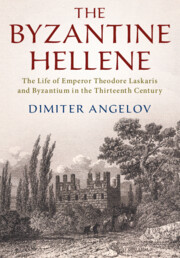Book contents
- The Byzantine Hellene
- The Byzantine Hellene
- Copyright page
- Dedication
- Contents
- Illustrations
- Maps
- Tables
- Acknowledgments
- List of Historical Figures
- List of Rulers in Byzantium and Beyond
- Author’s Note
- Introduction
- 1 Byzantium in Exile
- 2 “The Holy Land, My Mother Anatolia”
- 3 “I Was Raised as Usual for a Royal Child”
- 4 Pursuit of Learning
- 5 Power-Sharing
- 6 Friends, Foes, and Politics
- 7 Elena and the Embassy of the Marquis
- 8 Sole Emperor of the Romans
- 9 The Philosopher
- 10 The Proponent of Hellenism
- Epilogue
- Notes
- Book part
- Bibliography
- Index
9 - The Philosopher
Published online by Cambridge University Press: 15 July 2019
- The Byzantine Hellene
- The Byzantine Hellene
- Copyright page
- Dedication
- Contents
- Illustrations
- Maps
- Tables
- Acknowledgments
- List of Historical Figures
- List of Rulers in Byzantium and Beyond
- Author’s Note
- Introduction
- 1 Byzantium in Exile
- 2 “The Holy Land, My Mother Anatolia”
- 3 “I Was Raised as Usual for a Royal Child”
- 4 Pursuit of Learning
- 5 Power-Sharing
- 6 Friends, Foes, and Politics
- 7 Elena and the Embassy of the Marquis
- 8 Sole Emperor of the Romans
- 9 The Philosopher
- 10 The Proponent of Hellenism
- Epilogue
- Notes
- Book part
- Bibliography
- Index
Summary
Theodore Laskaris made seminal contributions to intellectual life of his time as a philosopher and as a fervent advocate of Hellenism. Both by his training and in his frame of mind, he was a consummate philosopher. His interest in the principles governing the universe manifested itself in treatises and digressions on philosophical questions, in both letters and other works. His ideas point in different directions and resist facile classification into taxonomies of schools of thought. His originality has already attracted attention. In 1930 the historian of Nicaean court culture Maria Andreeva noted his empirical interests in nature and called his treatise Representation of the World, or Life (the third book of his Explanation of the World) “a major stride forward, a beginning of an evolution of thought – a turn toward experience and nature” that came to an abrupt end on account of the author’s untimely death.1 In 1949 the historian of philosophy Basil Tatakis added that Theodore opened a new chapter in Byzantine thought, because the treatise Natural Communion understood “nature in a purely philosophical way.”2 For another historian of philosophy, Gerhard Richter in 1989, Natural Communion showed that thirteenth-century Byzantine philosophy moved on a secular path well beyond the frameworks set in the late antique philosophical schools.3 Theodore Laskaris’ interests in nature and mathematics have led to comparisons to his Western contemporary Roger Bacon (c. 1220–c. 1292) as well as to Spinoza (1632–77), even though differences have also been noted.4 Philosophers and philologists are yet to explore the richness of his thought and prepare much-needed editions of his two important philosophical treatises, Natural Communion and Explanation of the World.5 The following discussion – by necessity brief and preliminary – aims to paint with broad brushstrokes a philosophical portrait of Theodore Laskaris through the analysis of salient strands of his thought: his views on nature; his empirical and humanistic approach; his fascination with the occult; the interest in geometry and numerology that led him to attempt a synthesis with theology; the related critique of scholasticism; and his cultivation of philosophical irony.
- Type
- Chapter
- Information
- The Byzantine HelleneThe Life of Emperor Theodore Laskaris and Byzantium in the Thirteenth Century, pp. 181 - 201Publisher: Cambridge University PressPrint publication year: 2019



